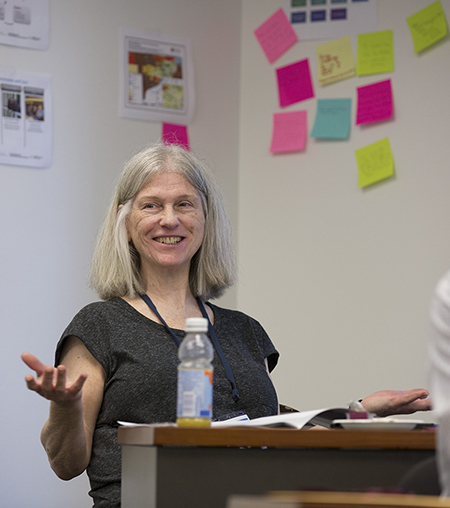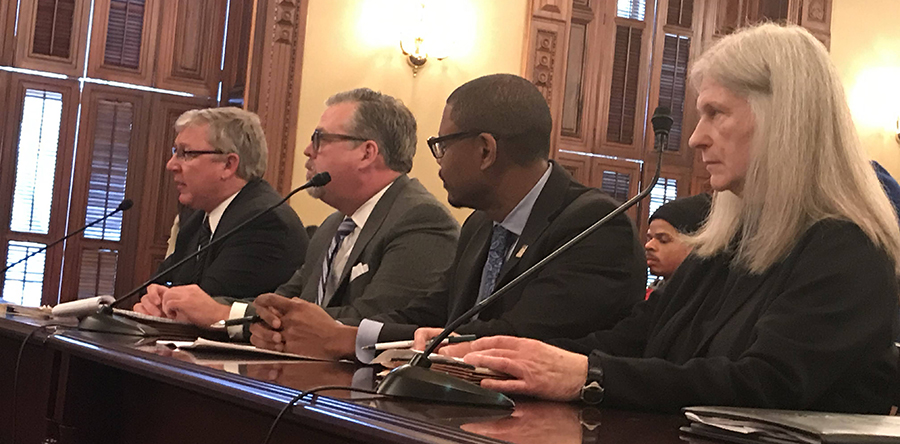September 28, 2022
Wendy Pollack is the founder and director of the Women’s Law and Policy Initiative at the Shriver Center on Poverty Law. Prior to law school, she worked as a union carpenter for eight years and is a founding member of Chicago Women Carpenters, which began in 1979 and evolved into Chicago Women in Trades (CWIT) in 1982. CWIT is a nonprofit that supports economic equity for women working in construction and other blue-collar jobs.
Pollack has lived most of her life on the north side of Chicago. She decided to attend law school following her activism in the trades. After law school, Pollack worked at the Legal Assistance Foundation of Chicago (LAFC) (now Legal Aid Chicago), first as a staff attorney at its Englewood office and then on welfare-to-work issues as part of the Welfare Law Team.

How did your career start?
I was working as a claims representative for the Social Security Administration. I wanted to do something more interesting, and hopefully not behind a desk. And as a feminist, I wanted a job not only to financially support myself, but that would align with my social justice beliefs. At the time, women were breaking down barriers to occupations and industries that had always employed white men.
I sought out women working in the trades. I investigated different trades and started to sign up on apprenticeship lists. One of the first to open was the carpenter’s union. I remember standing in line all day just to get on the list and counting the number of women there. It was maybe 50 women out of several hundred people. There had been some women in the carpenter’s union before that. Most were cabinet makers, but I wanted to do outside construction. After a year, I eventually got into the apprenticeship program. I was the only woman out of 80 apprentices in my class. It was daunting.
How did you get involved with Chicago Women in Trades?
Once accepted into the apprenticeship program, I attended Washburne Trade School. Since I was the only women in my class, I was desperate to meet other women carpenters. One of the more empathetic teachers put me in touch with another woman carpenter. A handful of us met for the first time in one of our apartments in January 1979. We understood right away that we had to act together so that we could survive in the trades and help other women get in. We organized and became Chicago Women Carpenters.
After two years, as more women entered carpentry and other trades, we became Chicago Women in Trades. As part of our activism we incorporated a legal strategy. For this, we partnered with the Women’s Law Project at LAFC to pursue legal actions. It was then that I saw firsthand that lawyers could make real social justice change.
What got you interested in becoming a lawyer?
I was in the trades for eight years, and it was difficult. Women were always “last hired, first fired.” When asked about being a tradeswoman (and the question was implicitly, not how do I like being a carpenter, but what is it like being a woman on a construction site), I often said, “I like the work but not the job.” It was survival, dealing with the barrage of psychological and physical warfare targeted at me personally and women in general. It became too much, and I started thinking about what else to do. I settled on law school because of the positive experiences I had had with lawyers. It was a different way of making the same changes that I was trying to make as a carpenter. I started Harvard Law School in the fall of 1986.
Where did you end up after law school?
After law school, I had to decide whether to come back to Chicago or work in another city like Washington, D.C. I ended up coming home and working for LAFC. I had interned my first summer of law school at LAFC, working with John Bouman (former Shriver Center president). It was a terrific experience, and I knew that’s probably where I wanted to end up.
At LAFC, I first worked at the Englewood office at 63rd and Halsted. I represented survivors of domestic violence pursuing orders of protection and divorces, and people with disabilities pursuing Social Security benefits, among other clients. My clients kept saying to me, “If I have to go to court one more time, I’m going to lose my job.” That pattern I and advocates in other states saw helped to plant the seed for what eventually became the Victims’ Economic Security and Safety Act (VESSA).
It was a foundational experience going to court every day with clients living in poverty and, for most, surviving racism. After a few years, I joined the Welfare Law Team at LAFC, where I was able to engage in policy advocacy. Although we continued to litigate, we began to do more legislative advocacy because it was often more efficient and effective.
How far do you think we’ve come? What else needs to be done?
We have a long way to go in fighting poverty and achieving gender, racial, and economic justice. For example, there continues to be occupational segregation. Once upon a time, bank tellers were only men, but as women entered the profession, it became a lower wage job. We’re still dealing with the same issue — as more women and people of color enter a field, it becomes devalued. And too many workers, particularly low-wage workers who are mostly women and people of color, are not treated fairly in the workplace. We need to consider what it means to have a good job and lead a healthy and decent life.
In too many ways, we are going backward, highlighted by the Supreme Court’s recent Dobbs decision. There is so much connected to how women are treated by the law and how that impacts their employment and economic prospects. But there have also been positive changes. Throughout my career, I have worked to contribute to that progress.

What’s your proudest achievement?
It’s been 40 years since Chicago Women in Trades became an official organization. It’s not just a place that trains, supports, and advocates for women — it really is a home, a sisterhood. It is certainly one of my proudest accomplishments.
As an attorney, an early legislative effort, the Family Violence Option (FVO), stands out. The FVO was incorporated into the 1996 federal welfare reform and allows states to waive Temporary Assistance for Needy Families (TANF) requirements for survivors of domestic violence. The FVO helped transform domestic violence from primarily criminal law to one that also needed to be addressed in civil law. Since its passage, there has been a marked expansion of rights and policies related to gender-based violence in civil law, such as the Victims’ Economic Security and Safety Act (VESSA) — which I also am very proud of.
Systemic inequities and the legacy of structural racism make it harder for low-income people and people of color to achieve financial stability.
Everyone should be paid decently and have basic workplace protections.